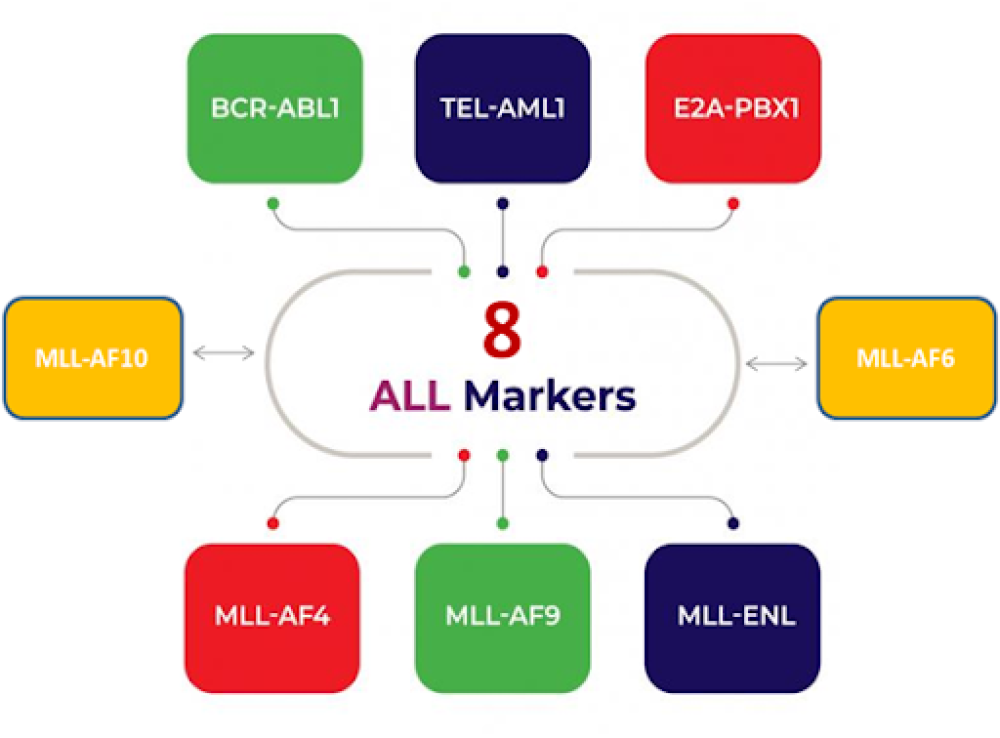TRUPCR® ALL Panel Kit is intended for the qualitative detection & differentiation of diagnostic and prognostic markers of Acute Lymphoblastic Leukemia (ALL) in peripheral blood or bone marrow samples using real time PCR system. TRUPCR® ALL Panel Kit is based on Real time PCR. In real-time PCR, the analysis is based on fluorescent signal generated from the presence of an oligonucleotide probe specific for target DNA sequence. It is comprehensive kit which includes complete cDNA chemistry for RNA based transcripts.
Key Features:
- Comprehensive detection and differentiation of most common diagnostic and prognostic markers for ALL
- Sample Type – EDTA Blood / Bone Marrow
- All Inclusive Kit as all reagents for cDNA chemistry, PCR and real-time PCR are included
- Sensitivity to detect up to 10 copies of fusion transcripts
- Compatible Instruments – Applied Biosystems™ 7500 series / StepOne series / QuantStudio® series, Rotor-Gene Q, Bio-Rad CFX96, CFX384, AriaMx Real-Time PCR, Roche - LightCycler® 480 – II, Line gene K Real-Time PCR

Mutation Variants detected by TRUPCR® ALL Panel Kit
| Gene | Variant |
|---|---|
| E2A-PBX1 | TCF3-PBX1 |
| TEL-AML1 | BCL2L14-RUNX1 |
| MLL-AF4 | MLL_AF4_e10-e4 |
| MLL_AF4_e9-e4 | |
| MLL_AF4_e9-e5 | |
| MLL_AF4_e11-e4 | |
| MLL_AF4_e9-e6 | |
| MLL-ENL | MLL_ENL_e9-e2 |
| MLL_ENL_e10-e2 | |
| MLL-AF9 | MLL_AF9_e8-e9 |
| MLL_AF9_e8-e10 | |
| MLL_AF9_e10-e6 | |
| MLL-AF6 | MLL_AF6_e9-e2 |
| MLL-AF10 | MLL_AF10_e9-e4 |
| BCR-ABL1 | e13a2 & e14a2 (p210 |
| e1a2 (p190) | |
| e19a2(p230) |
Leukemia is defined as neoplastic proliferation of abnormal white blood cells (WBCs) and Acute Lymphoblastic Leukemia (ALL) is mainly a disease of childhood that arises from recurrent genetic alterations that block precursor B- and T-cell differentiation and drive aberrant cell proliferation and survival. These genetic lesions influence the prognosis and therapeutic approach used for treatment of ALLs. Chromosomal translocation is the hallmark of leukaemias and acute lymphoblastic leukaemia (ALL) in particular. DNA damage arises from endogenous and exogenous genotoxic factors and lack of complete fidelity in DNA-repair leads to chromosomal translocations. Chromosomal breakpoints tend to occur at transcriptionally active DNA sites and the fusion gene transcripts generally involve genes which frequently encode cell cycle regulators, transcription factors, signal transduction molecules, receptors or immunoglobulin and TCR molecules. Due to the chromosomal translocations and subsequent expression of fusion gene transcripts, the normal functions of the genes are altered.
Due to the advances in the cytogenetic and molecular characterization of the acute leukemias in the past two decades, genetic alterations can now be identified in more than 80% of cases of ALL. Recent evidences show that the identification of new ALL biomarkers contributes to a better understanding of the molecular basis of the disease, are significantly useful in screening, diagnosis, prognosis and monitoring of ALL, as well as the possibility of predicting each individual´s response to treatment.
Ordering Information:
| CAT. NO. | PRODUCT | CONTENTS |
|---|---|---|
| 3B1405 | TRUPCR® ALL Panel Kit | 24 Reactions |
| 3B1408 | TRUPCR® ALL Panel Kit | 48 Reactions |
Publications :
